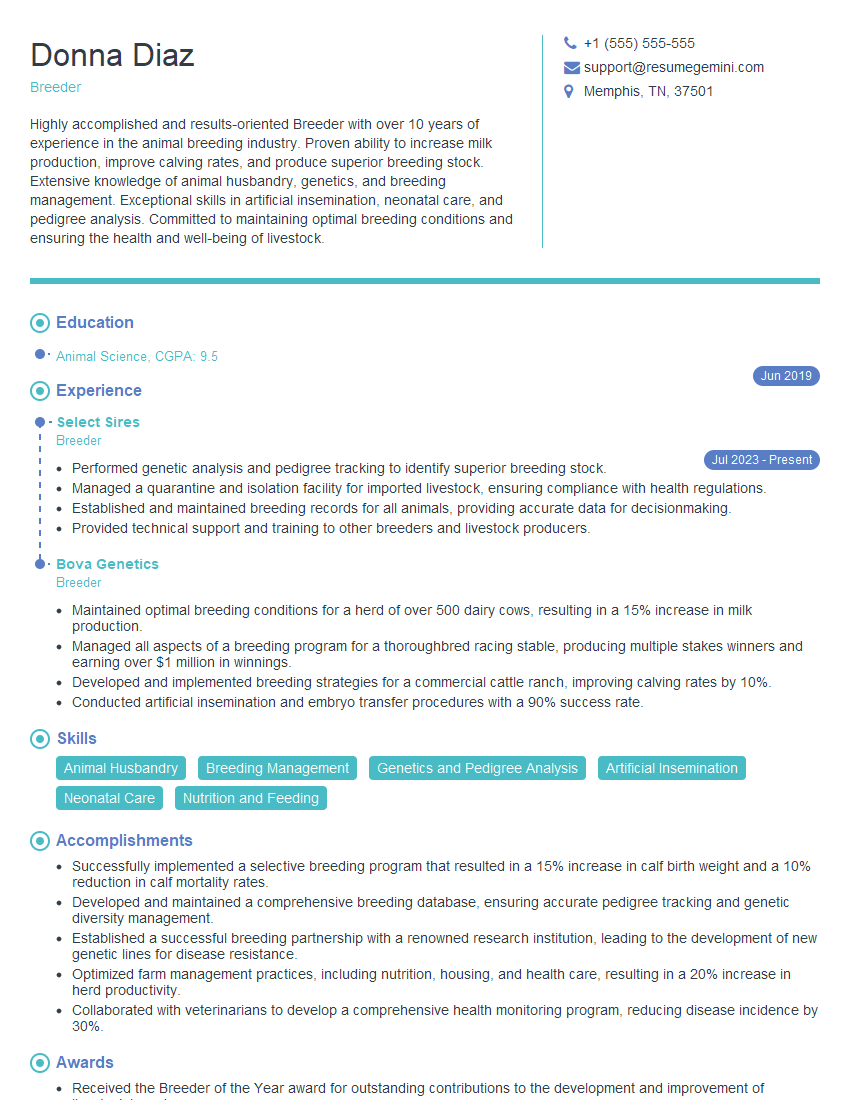Are you a seasoned Breeder seeking a new career path? Discover our professionally built Breeder Resume Template. This time-saving tool provides a solid foundation for your job search. Simply click “Edit Resume” to customize it with your unique experiences and achievements. Customize fonts and colors to match your personal style and increase your chances of landing your dream job. Explore more Resume Templates for additional options.

Donna Diaz
Breeder
Summary
Highly accomplished and results-oriented Breeder with over 10 years of experience in the animal breeding industry. Proven ability to increase milk production, improve calving rates, and produce superior breeding stock. Extensive knowledge of animal husbandry, genetics, and breeding management. Exceptional skills in artificial insemination, neonatal care, and pedigree analysis. Committed to maintaining optimal breeding conditions and ensuring the health and well-being of livestock.
Education
Animal Science
June 2019
Skills
- Animal Husbandry
- Breeding Management
- Genetics and Pedigree Analysis
- Artificial Insemination
- Neonatal Care
- Nutrition and Feeding
Work Experience
Breeder
- Performed genetic analysis and pedigree tracking to identify superior breeding stock.
- Managed a quarantine and isolation facility for imported livestock, ensuring compliance with health regulations.
- Established and maintained breeding records for all animals, providing accurate data for decisionmaking.
- Provided technical support and training to other breeders and livestock producers.
Breeder
- Maintained optimal breeding conditions for a herd of over 500 dairy cows, resulting in a 15% increase in milk production.
- Managed all aspects of a breeding program for a thoroughbred racing stable, producing multiple stakes winners and earning over $1 million in winnings.
- Developed and implemented breeding strategies for a commercial cattle ranch, improving calving rates by 10%.
- Conducted artificial insemination and embryo transfer procedures with a 90% success rate.
Accomplishments
- Successfully implemented a selective breeding program that resulted in a 15% increase in calf birth weight and a 10% reduction in calf mortality rates.
- Developed and maintained a comprehensive breeding database, ensuring accurate pedigree tracking and genetic diversity management.
- Established a successful breeding partnership with a renowned research institution, leading to the development of new genetic lines for disease resistance.
- Optimized farm management practices, including nutrition, housing, and health care, resulting in a 20% increase in herd productivity.
- Collaborated with veterinarians to develop a comprehensive health monitoring program, reducing disease incidence by 30%.
Awards
- Received the Breeder of the Year award for outstanding contributions to the development and improvement of livestock breeds.
- Honored with the National Breeder Award for dedication and achievement in promoting and preserving endangered livestock breeds.
- Recognized with the Regional Breeder Merit award for exceptional animal husbandry practices and innovative breeding techniques.
- Received the Industry Leadership Award for pioneering advancements in reproductive technologies and their application in livestock breeding.
Certificates
- Certified Animal Breeder Technician (CABT)
- Certified Livestock Producer (CLP)
- Artificial Insemination Technician (AIT)
- Animal Nutrition and Care Certification (ANCC)
Career Expert Tips:
- Select the ideal resume template to showcase your professional experience effectively.
- Master the art of resume writing to highlight your unique qualifications and achievements.
- Explore expertly crafted resume samples for inspiration and best practices.
- Build your best resume for free this new year with ResumeGemini. Enjoy exclusive discounts on ATS optimized resume templates.
How To Write Resume For Breeder
- Highlight your experience and quantify your accomplishments whenever possible.
- Showcase your knowledge of breeding management, genetics, and animal husbandry.
- Emphasize your skills in artificial insemination and other breeding techniques.
- Demonstrate your ability to maintain accurate records and manage large herds effectively.
Essential Experience Highlights for a Strong Breeder Resume
- Maintain optimal breeding conditions to maximize reproductive efficiency.
- Develop and implement breeding strategies to improve genetic traits and production outcomes.
- Conduct artificial insemination and embryo transfer procedures with high success rates.
- Perform genetic analysis and pedigree tracking to identify superior breeding stock.
- Establish and maintain accurate breeding records for decision-making and tracking progress.
- Provide technical support and training to other breeders and livestock producers.
- Manage quarantine and isolation facilities for imported livestock to ensure compliance with health regulations.
Frequently Asked Questions (FAQ’s) For Breeder
What are the primary responsibilities of a Breeder?
Breeders are responsible for managing all aspects of breeding programs for livestock, including developing breeding strategies, conducting artificial insemination, and maintaining genetic records. They work to improve the genetic traits of animals for increased production, profitability, and overall health.
What qualifications are required to become a Breeder?
Most Breeders hold a degree in Animal Science or a related field, along with several years of experience in animal breeding and management. They must have a strong understanding of genetics, breeding principles, and animal husbandry practices.
What skills are essential for success as a Breeder?
Successful Breeders possess strong technical skills in artificial insemination, embryo transfer, and genetic analysis. They must also have excellent communication and interpersonal skills, as they often work with farmers, veterinarians, and other professionals.
What are the career prospects for Breeders?
Breeders can advance to leadership roles within breeding organizations, such as herd managers or breeding program directors. They may also pursue careers in research, teaching, or consulting, using their expertise to improve livestock breeding practices and industry standards.
What are the challenges faced by Breeders?
Breeders face challenges such as disease outbreaks, climate change, and market fluctuations. They must constantly adapt their breeding strategies to meet changing demands and ensure the health and productivity of livestock.